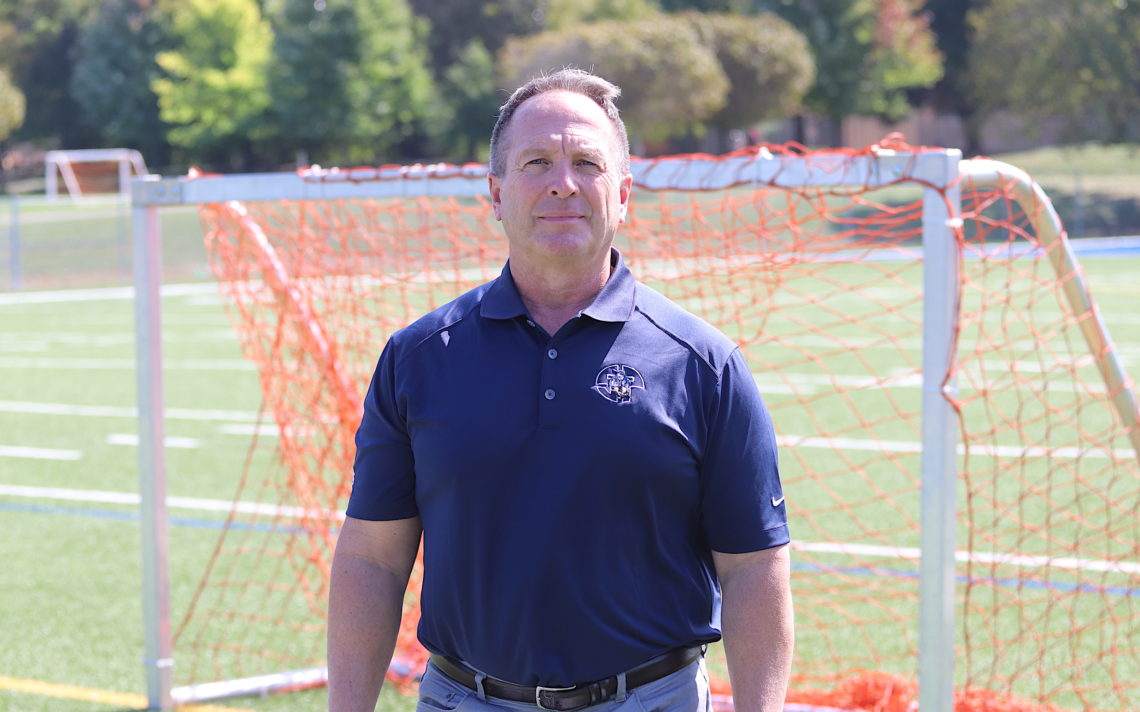
Oreskovich born to coach
Coaching football has always been in Rick Oreskovich’s blood.
“As a young kid, I would organize neighbourhood games in the park because I simply loved the sport,” the 60-year-old Niagara Falls native said. “Being an average player in high school, my passion and interest to be involved with the sport once high school was over continued to grow.
“One of the main reasons I went into teaching was to coach football.”
The current head coach of the Saint Paul Patriots senior football team is now into his 33rd year of teaching business and physical education and his coaching career dates back even farther. While still a Brock University student in 1982, he helped coach the Saint Paul junior football team in the school’s first year of existence. In 1987 while attending teacher’s college, helped with the junior team at College Avenue High School in Woodstock.
It was only fitting that the former Notre Dame player began his coaching career at his alma mater, where he once suited up for Dan Bishop, Paul Barchiesi, Geoff Howe, Ted O’Leary and Father Keating.
 “I thoroughly enjoyed that experience, especially the interaction with the coaching staff,” he said. “Not only were they great coaches and teachers, they became good friends.”
“I thoroughly enjoyed that experience, especially the interaction with the coaching staff,” he said. “Not only were they great coaches and teachers, they became good friends.”
Under coaches Sam Liota and Joe Perri, Oreskovich served as defensive coordinator until taking over as head coach in 1994.
His first season was a trying one as the Irish finished with an 0-5 record.
Oreskovich jokes that he went by the name of Ricky O and 5 but the winless campaign clearly didn’t sit well with him. He attended numerous off-season clinics and staged last-summer workouts that helped turn Notre Dame’s program around. The 1995 version of the Fighting Irish lost one regular season game and made it to the finals. It was a harbinger of things to come.
“During 1996 to 2000, I had the pleasure of coaching with Tim Bisci and Bernie Tessier,” Oreskovich said. “With their tremendous impact and passion for football, our teams went to the final every year and won two championships.”
In 2001, he transferred to Saint Paul and continued to enjoy plenty of success with the Patriots.
“I was very fortunate again to be coaching with teachers, like my brother Joe Oreskovich, who is one of the best quarterback coaches around, defensive coordinator Paolo Sirianni, Brian Fortier, John Fisher, Bernie Tessier, Mark Antonelli, Gary Snyder, Adam Dixon and many other ex-players who came back to coach,” he said. “Without their dedication and help, my job as head coach would have been impossible.”
Oreskovich was equally dedicated.
“As time went on, I learned by attending yearly coaching clinics and over a five-year period I took my quarterbacks to George Curry’s quarterback camps in Berwick, Pa. I would film the camp and I learned a great deal about the high school coaching philosophy in the U.S.A.”
He is ever-evolving as a coach.
“Football is a game where you never stop learning. As I watch football in my living room, I always have a notepad available to take notes on something that looks interesting.”
None of his success would have been possible without players willing to do the work. At Saint Paul, the coaching staff ran summer workouts in the weight room and on the field to prepare for the fall.
“Attendance was always a concern because many of the players worked during the summers,” he said. “However, the coaching staff was available to improve their strength and skills.”
Oreskovich describes coaching as a challenging profession.
“You are constantly being asked to make decisions which impact not only yourself but also your athletes and your team.”
His philosophy is simple: Come to practice; attend team meetings; keep in shape; put forth 100 per cent effort; and, don’t focus on winning.
“Winning is a result of how your team performs, how the coaches coach and how focused the players are,” he said. “We preach that each player must be successful every play by completing their assigned task.”
Oreskovich always tries to make the season fun and rewarding for his players, but admits that that doesn’t always happen.
“We try our best as coaches to teach on the field in the same manner as we teach in the classroom, but with a little more humour, friendship and camaraderie.”
He credits his longevity in coaching to the support of his wife Karen and four children, three of whom played football at Saint Paul.
“They support me every time I hit the field and I am only as effective as the tremendous help I get from them and the coaching staff that I have had the pleasure of coaching with over the past 32 years.”
Like all his coaching colleagues, Oreskovich has seen the COVID-19 pandemic hit the pause button on his coaching career . He is finding other things to keep himself busy. He spends his time teaching at school and working on home renovations in his spare time.
 “During the season, the sport of coaching football is a huge responsibility,” he said, adding all the public and Catholic football coaches in Niagara are dedicated, effective, hardworking, passionate and all strive to make their programs competitive.
“During the season, the sport of coaching football is a huge responsibility,” he said, adding all the public and Catholic football coaches in Niagara are dedicated, effective, hardworking, passionate and all strive to make their programs competitive.
“All of the football programs provide care, effective instruction, motivation and competition,” he said. “For the majority of the players that do not pursue football after high school, we as coaches all try to make their experience positive because their memories will last them a lifetime.”
It isn’t only high school football where Oreskovich has made his mark.
“Rick had a major impact on the growth and development of minor football in Niagara,” Sirianni said. “The first graduating class of players through the minor system became high school football stars and brought the scouts into the Niagara region.”
Among those stars were John Surla, Jeremy Hipperson, Giancarlo Rapanaro, Justin Lundy and James Savoie.
Oreskovich’s commitment and dedication helped produce stars at Saint Paul and Notre Dame. Upwards of 60 of his players moved on to play at the next level.
Sirianni, who describes Oreskovich as coaching role model and friend, loves how his mentor challenges his players to play at the highest level.
“At Saint Paul, we have regularly been a smaller population school but he always played in the top division against schools that had more students. He never shied away just to win at a lower division . He always felt that if you want to raise your game, work harder and put in the time instead of playing down a division.”
Through all this, Oreskovich created a football family at Saint Paul
“These relationships with the players are what he always talks about,” Sirianni said. “Many former players such as Brian Fortier, John Zarafonitis, Harry McMaster and Adam Dixon have played at the next level, graduated and have successful careers. Yet they still come back to coach at Saint Paul. That shows the family that he created for the players.”

























